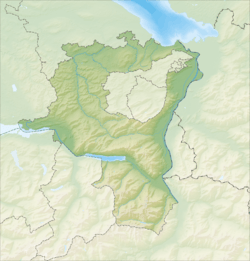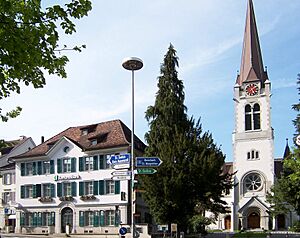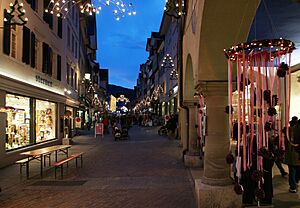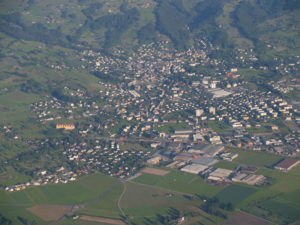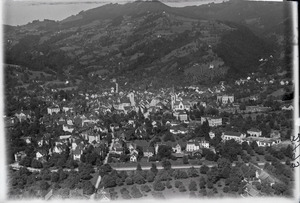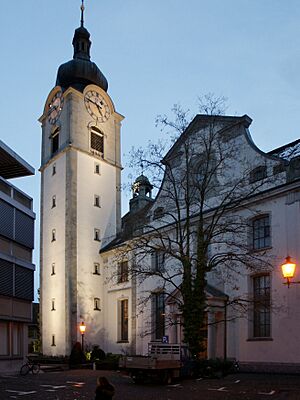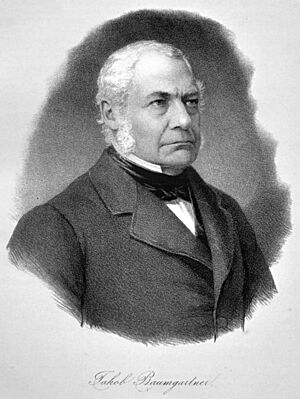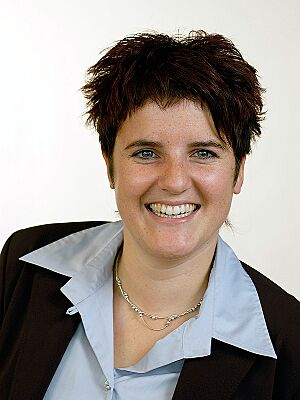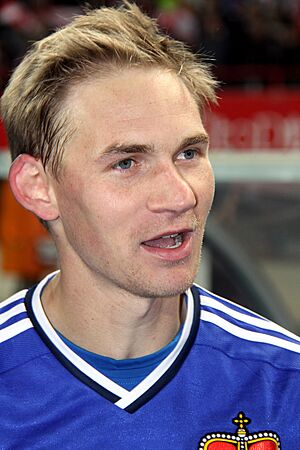Altstätten facts for kids
Quick facts for kids
Altstätten
|
||
|---|---|---|
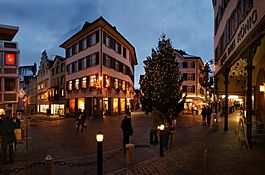 |
||
|
||
| Country | Switzerland | |
| Canton | St. Gallen | |
| District | Rheintal | |
| Area | ||
| • Total | 39.46 km2 (15.24 sq mi) | |
| Elevation
(Cross of Rorschacher- and Churerstrasse))
|
455 m (1,493 ft) | |
| Population
(Dec 2020 )
|
||
| • Total | 11,938 | |
| • Density | 302.53/km2 (783.56/sq mi) | |
| Demonym(s) | German: Altstätter(in) | |
| Postal code |
9450
|
|
| Localities | Lüchingen, Hueb, Unter-Kobelwies, Kornberg, Gätziberg, Warmesberg, Hinterforst Lienz, Plona | |
| Surrounded by | Eichberg, Feldkirch (AT-8), Gais (AR), Marbach, Oberegg (AI), Oberriet, Ruggell (LI), Rüte (AI), Rüthi, Sennwald, Trogen (AR) | |
Altstätten is a historic town and a municipality in the Rhine Valley district of St. Gall canton in Switzerland. It is about 5 kilometers west of the Alpine Rhine river. This river forms the border with Austria. Altstätten also provides access to the higher Appenzell region to the west.
The official language in Altstätten is German. However, most people speak a local Alemannic dialect called Swiss German.
Contents
- Discovering Altstätten: A Swiss Town
- Altstätten's Past: A Glimpse into History
- Understanding the Altstätten Coat of Arms
- Exploring Altstätten's Geography
- People and Population in Altstätten
- Religious Life in Altstätten
- Altstätten's Economy
- Places to See in Altstätten
- Sports in Altstätten
- Getting Around: Transport in Altstätten
- Famous People from Altstätten
- See Also
Discovering Altstätten: A Swiss Town
Altstätten is located between the towns of St. Margrethen and Buchs/SG. It sits near the Austrian border, at the foot of the Alpstein Mountains. From Altstätten, you can take a special rack-and-pinion railway line. This railway, part of the Appenzeller Trams, goes to Gais.
The town used to have an electric tramway from 1897 to 1973. It also had trolleybuses from 1940 to 1977, running to Berneck. Today, Altstätten uses a bus network called RTB for public transport.
Altstätten is famous for its long and lively carnival tradition, especially the Shrove-Tuesday celebrations. Every January and February, groups like the Röllelibutzen-club (started in 1919) perform. Many youth music societies from the town and region also take part. A big event is the international parade, which brings over 30,000 visitors from all over Switzerland.
Altstätten's Past: A Glimpse into History
Altstätten was first mentioned in historical records in the year 853. Back then, it was known as Altsteti.
Understanding the Altstätten Coat of Arms
The blazon (a description of a coat of arms) for Altstätten's municipal coat of arms is: Or a bear passant Sable langued, armed and in his virility Gules and in chief a Mullet of Five of the last. This means it shows a black bear walking on a gold background. The bear has a red tongue, claws, and male parts. Above the bear is a red five-pointed star.
Exploring Altstätten's Geography
Altstätten covers an area of about 39.5 square kilometers. A large part of this land, about 63.3%, is used for farming. Forests cover 21.1% of the area. About 12.7% of the land has buildings or roads. The remaining 2.9% includes rivers or lakes.
The municipality is the main town of the Rheintal Wahlkreis (an electoral district). It used to be the capital of the Oberrheintal district. This traditional farming town is on the western side of the Rhine river. It sits between the hills of the Appenzell region.
People and Population in Altstätten
Altstätten has a population of 11,938. As of 2007, about 21.5% of the people living here were from other countries. Most people in Altstätten speak German, which is 89.0% of the population. Other languages spoken include Albanian (3.1%) and Serbo-Croatian (2.7%).
When it comes to education, about 64.4% of adults (aged 25–64) in Altstätten have finished either upper secondary education or higher education. This means they went to university or a specialized college.
The population of Altstätten has changed over time:
| year | population |
|---|---|
| 1800 | ca. 4,900 |
| 1850 | 6,492 |
| 1900 | 8,724 |
| 1950 | 8,603 |
| 2000 | 10,381 |
Religious Life in Altstätten
Based on the 2000 census, about 59.9% of the people in Altstätten are Roman Catholic. Another 19.7% belong to the Swiss Reformed Church. Other Christian faiths are also present. About 7.34% of the population is Islamic. Some people belong to other religions, or do not belong to any church.
Altstätten's Economy
Altstätten has a low unemployment rate, which was 2.17% in 2007. Many people work in different areas here. In 2005, about 399 people worked in agriculture (farming). There were 147 businesses in this area.
The secondary sector, which includes manufacturing, employed 2,675 people. This sector had 152 businesses. The largest number of people, 3,313, worked in the tertiary sector. This sector includes services like shops, offices, and healthcare. There were 426 businesses in this sector.
In 2000, 3,302 residents worked within Altstätten itself. Also, 3,269 people traveled into Altstätten for work from other places.
Places to See in Altstätten
The village of Altstätten is part of a special area known as the Schlosslandschaft Ober/Unterrheintal. This area includes many castles and is recognized as an important Swiss heritage site. It spans Altstätten and nearby towns like Balgach, Berneck, and Marbach.
Sports in Altstätten
Altstätten has a football club called FC Altstätten, which was founded in 1945. In the 1970s, the club played at a high national level. Today, the team plays in the 2. Liga.
Getting Around: Transport in Altstätten
Altstätten has two train stations. Altstätten Stadt is the end of the line for the Altstätten–Gais railway. Altstätten SG is a stop on the main Chur–Rorschach line. This station has frequent train services, both local and long-distance.
Famous People from Altstätten
18th century
- Johann Jakob Haltiner (1728–1800) – a church architect.
- Johann Ludwig Ambühl (1750–1800) – an educationalist and writer.
- Gallus Jacob Baumgartner (1797–1869) – a Swiss statesman and important federalist.
19th century
- Wilhelm Matthias Naeff (1802–1881) – a Swiss politician and one of the first members of the Swiss Federal Council.
- Carl Eugen Keel (1885–1961) – a Swiss expressionistic painter known for his woodcuts.
- Ferdinand Gehr (1896–1996) – a Swiss painter.
20th century
- Paul Baumgartner (1903–1976) – a Swiss pianist.
- Jakob Freund (born 1946) – a politician and Swiss folk musician.
- Gardi Hutter (born 1953) – a Swiss clown, comedian, author, and actress.
- Marcel Gisler (born 1960) – a Swiss film director and screenwriter.
- Jasmin Hutter (born 1978) – a Swiss politician who serves on the National Council of Switzerland.
Sports Personalities
- Yvonne Elkuch (born 1968) – a cyclist from Liechtenstein who competed in the Olympics.
- Nagwa El Desouki (born 1971) – a Swiss Olympic slalom canoer.
- Lars Burgsmüller (born 1975) – a former German tennis player who lives in Altstätten.
- Rainer Schüttler (born 1976) – a retired German professional tennis player who lives in Altstätten.
- Ivo Heuberger (born 1976) – a retired tennis player who represented Switzerland.
- Remo Lütolf (born 1980) – a Swiss breaststroke swimmer who competed in the Olympics.
- Marc Benz (born 1982) – a Swiss racing driver.
- Daniela Casanova (born 1984) – a Swiss former professional tennis player.
- Myriam Casanova (born 1985) – a Swiss former professional female tennis player.
- Stefan Frei (born 1986) – a Swiss football goalkeeper who plays in Major League Soccer.
- Martin Rechsteiner (born 1989) – a footballer from Liechtenstein who plays internationally.
- Orhan Ademi (born 1991) – a Swiss footballer.
- Gabriel Lüchinger (born 1992) – a Swiss footballer.
See Also
 In Spanish: Altstätten para niños
In Spanish: Altstätten para niños




